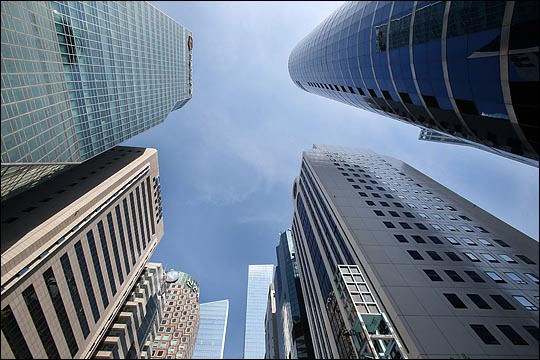Economy
S. Korean conglomerates’ cash reserves hit record high
South Korea’s 10 largest conglomerates held record-high cash reserves last year, as they earned more on thriving chip businesses but spent less on fears of a sluggish economic outlook.
According to local corporate tracker Chaebul.com on March 17, the business groups by assets had combined cash reserves of around 248 trillion won ($218 billion) last year, up 12.2 percent from 2017, based on the consolidated financial statements of their 95 affiliates.
The cash reserves include a combination of cash, cashable assets, short-term financial products that can easily be monetized and deposits in financial organizations.
Samsung had the largest cash reserves of 125 trillion won, a 22.6 percent rise from the previous year. Its key tech arm, Samsung Electronics, had 104 trillion won, up 24.7 percent from 2017, driven by a two-year boom in memory chips.
 |
Hyundai Motor Group followed with around 42 trillion won, up 1.2 percent year-on-year. Its cash stood at 17 trillion won, a 2.9 percent rise. Its auto parts arm, Hyundai Mobis, had 10 trillion won in cash, an 11.8 percent increase.
The cash reserves of the auto group was followed by SK, LG and Posco.
SK Group came in third with 28.5 trillion won, a 3.5 percent rise on-year. LG Group had 13 trillion won, down 0.1 percent, Posco had 11 trillion won, up 11.1 percent, while Lotte and Hanwha had 8.5 trillion won each.
The record-high cash reserves of the nation’s top 10 companies last year were due to their conservative use of funds over concerns of a possible recession, experts said.
“Although the top 10 group’s financial statements looked stable due to a rise in operating profit last year, they seemed to have been passive in making investments for future growth engines due to the grim economic outlook. Especially, their investments in manufacturing facilities was more passive,” said Chung Sun-seob, CEO of Chaebul.com.
According to the Financial Supervisory Service, the capital expenditure of Korean companies went down 4.2 percent last year from the previous year, which was the largest drop since 2009, a year after the global financial crisis.
Kim Han-jin, a senior economist at KTB Investment & Securities, said many companies tried to hold cash in their hands to hedge against the possible global economic downturn, including a prolonged trade dispute between the US and China.
By Shin Ji-hye/The Korea Herald (shinjh@heraldcorp.com)








